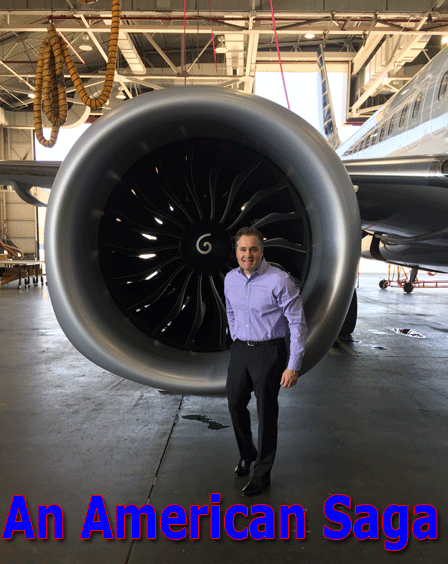 Richard
Elieson is the President of Cargo at the world’s biggest airline.
He came to that top post in March 2017. Richard
Elieson is the President of Cargo at the world’s biggest airline.
He came to that top post in March 2017.
Here are some fresh takes on an industry
in change, as Rick evaluates everything (including himself) a year and
a half after he assumed command.
What emerges is a gift to air cargo. The
lines to the future are clear and in sharp focus, and the fire of adventure
and discovery burns brightly for Rick Elieson.
Lucky us.
“I am awestruck by how much the average
consumer is dependent on air cargo,” Rick declares.
“On some level, people are aware of
that when it comes to e-commerce or perhaps auto parts or other big-ticket
specialty items.
“But I can’t walk into a grocery
store without being struck by the impact we have on the daily lives of
our neighbors.
“It isn’t one thing, it’s
practically everything.
“Maybe cargo veterans become numb
to this and begin to take it for granted like everybody else, but I’m
still amazed at the fabulously fresh fish I can get at my local market
even though Dallas is 300 miles from the nearest ocean.”
Maybe I’m
Amazed
“Admittedly, I am also amazed at some
of the inefficiencies that still exist in a business that is all about
getting things done as efficiently and smoothly as possible.
“Many years ago when I was on the
passenger side of the house, I formed a team to close the gap between
the pricing and inventory that we intended to distribute and what was
really happening in the market.
“Some of what we came up with was
shutting down gaming, fraud, or secondary markets, but most of it was
simply redefining policies or practices that allowed us to get the most
out of our limited assets.
“For example, by leveraging data and
increasing accountability you can reduce the variability of bookings that
don’t show up, or eliminate them all together. “
Making The
Customer Happy
“You can make customers happier by
increasing the capacity you make available while eliminating waste and
improving revenue.
“In cargo, I believe we have loads
(pun intended) of room to grow in this regard.”
Air Cargo
Report Card
“One of the things my team does really
well,” Rick Elieson said, “ is collaborate across functions.
“Beyond the expertise they demonstrate
within their respective area of responsibility, it is the dynamic of how
we work together that makes me most proud and that has greatly contributed
to making this a fun and really rewarding role.
“When you have a team that loves what
they do, and loves doing it with each other, that dynamic shows up in
positive ways over and over.
“I hope our customers see it too and
that it spills over into great customer service.”
Once More
Into The Breach
“We have big plans for the coming
year.
“With projects like the implementation
of a new IBS technology platform, and all of the change that it will require,
I can't imagine a better group of people to go through that with.”
The Changing
Scene
“Competition is always good.
“New entrants are a gift to the industry
for the way in which they highlight inefficiencies, missed opportunities,
or services that we’re failing to deliver as an industry, as well
as the way in which they compel or accelerate innovation and investment
in a better customer experience.
“As a team, we talk a lot about maintaining
a growth mindset and embracing feedback.
“It isn’t always easy to feel
appreciative for ground that is constantly shifting beneath your feet,
but it will keep you fit!
“That doesn’t mean I'm content
to lose ground to new entrants—quite the contrary.
“We pay them a lot of attention, and
respect the insights that come from doing so.”
The Airline
Forwarder Partnership
“We will always need forwarders.
“I’m not pandering.
“I often hear airlines say this sort
of thing, but I’m not always convinced they are sincere.
“Based on the way many forwarders
react, I don’t think they believe them either.
“It’s unfortunate because that
lack of trust is an inhibitor to the kind of things we can accomplish
together.
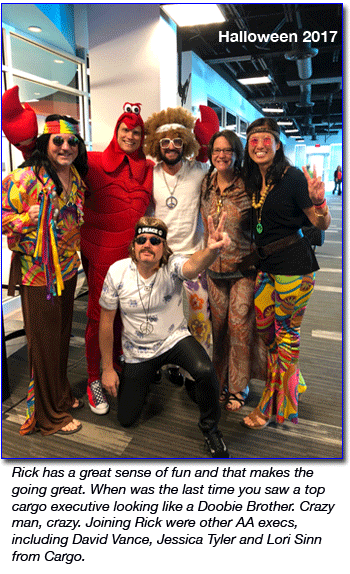 Just
For Instance Just
For Instance
“Allow me to share an experience from
last year and try to convince you to believe like I do, that the airline-forwarder
relationship is here to stay.
“It was just over a year ago when
a trio of hurricanes devastated parts of the U.S. Puerto Rico was especially
impacted and given our former hub in SJU, we have a lot of team members
with family or friends still on the island.
“We immediately launched an employee
program where any of American Airlines’ 130,000 team members could
send relief items to SJU for free.
“The massive response was both touching
and quite overwhelming. “In the first month following Hurricane
Maria, we shipped almost a million pounds of relief items from individual
team members.
“This was a direct person-to-person
program where employees brought their items to the airports and their
family member would pick it up at the airport on the other end.”
Partnership
That Works
“So what does this have to do with
forwarders?
“It not only became clear, but became
a dilemma for us, whether to move, for example, 100,000 pounds of aid
from 250 individuals (who each tendered separately) or 100,000 pounds
of aid from a handful of forwarders that was already built up and that
we could just roll through the warehouse and onto the plane.
“The solution became clear as only
one of those options was sustainable.
“We don’t have the infrastructure,
nor will we ever invest in on-airport facilities to support that kind
of direct-from-consumer demand.
“That doesn’t play to our strengths
and doesn’t make sense as a strategy for a passenger airline, no
matter how attractive it may appear in theory or on paper.
“Our forwarders run certified cargo-screening
facilities, so a lot of shipments arrive pre-screened and ready to roll
out the back door and onto a plane.
“Of course, we do a lot of build up,
too, but our capacity for that kind of traffic has physical limits that
will never keep up with the fragmented way in which demand for air cargo
is growing.”
Forwarders
Add Value
“That is but one lesson Hurricane
Maria taught me, but good forwarders add value to what we do as an airline
in many more ways.
“The more openly we work together
along with forwarders and shippers, the better we understand and can address
each other’s needs.”
Future Cast Starts With Digitalization
“Digitalization is a pre-requisite
to a lot of efficiency and improved utilization. I am absolutely convinced
that better access to data will lead to innovation.
“Tell me, what's your favorite technology
buzzword; big data, blockchain, cloud, AI, machine learning, IoT, VR,
AR, something else?
“I'm not aware of any Silicon Valley
startups applying those technologies against paperwork stored in boxes
in a warehouse.
“We can argue about the benefits of
eAWB, but we have to go digital and we have to accelerate our progress
if we want to avoid being disrupted by new competitors who don't have
the legacy systems and processes to overcome.”
Get It On
American
“This year we’re operating 150
widebody aircraft, and have placed an order for an additional 47 Boeing
787s, with deliveries starting in 2020
“Now, these new 787s will represent
increases in capacity, but our growth isn’t going to be confined
to growth in capacity.
“Improvements in utilization represent
significant opportunity too.
“I am confident that American is not
alone in that regard because many of the drivers to this sub-optimal utilization
are industry practices.
Admires Jose
Ubeda
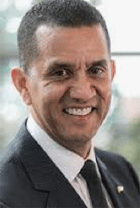 “I have met a lot of people whom I
have come to admire and I have been especially impressed with the entrepreneurial
spirit so prevalent among forwarders. But one name that comes immediately
to mind is Jose Ubeda at Expeditors. “I have met a lot of people whom I
have come to admire and I have been especially impressed with the entrepreneurial
spirit so prevalent among forwarders. But one name that comes immediately
to mind is Jose Ubeda at Expeditors.
“Jose is focused on investing in and
defining the industry’s future; he’s action oriented and he’s
passionate about workplace culture.
“Jose is self-made and dedicated to
giving back to the community in which he lives.
“Based on the way they work, it is
clear to me that Jose places a high value on trust and collaboration.
“These are all qualities that are
easy to admire.”
A Common
Misunderstanding
“I don't like referring to the items
we carry as ‘commodities,’” Rick said.
“The things we move have unique value
in people’s lives.
“Live organs or pharmaceuticals are
pretty obvious, but I feel the same way about produce and a lot of other
things we carry.
“We have an incredible impact on the
quality of people’s lives.
“The IATA study from a couple of years
ago concluded that while air cargo represents less than 1 percent of trade
volume, it represents 35 percent of the value.
“I’ve seen BTS estimates that
has the percent of volume remaining pretty steady over time, but with
the percent of value sharply rising.
“That doesn’t sound to me like
we’re carrying commodities.”
The Legacy
Thing
“I don’t aspire to be somebody
or something that I’m not.
“I honestly just want to do my best
every day. I feel like I’m about to start quoting lines from the
movie Bull Durham!
“I’ll put it this way.
“Growing up, I loved western movies.
My Name is Nobody was (and still is) one of my favorites.
“The central theme of the movie is
that ambition or fame has a way of backfiring.
“Happiness is found in authenticity
or honest relationships, hard work, and caring for others.”
The Last
Word
“This year we’ll turn in record
volumes along with record operational performance.
“We’re having a strong year.
“Although there’s a lot of noise
in the market around trade wars, I haven’t seen anything that has
dampened my optimism.
“If you look at the macroeconomic
trends, incomes are up, unemployment is down, and consumer confidence
is strong.
“And I don’t know anybody who
is planning to do less online shopping next year.”
If You Could
Change Something
“I would like to change two things
about air cargo: capacity utilization and digitalization, both of which
I’ve already ranted about.
“I believe they would ignite our industry,
and would be genuinely good for everyone.
“I don't think these are competitive
issues and I believe that each of them will require progress as an industry
in order to really make meaningful change, and so I hope I’m not
the only one who feels this way,” Rick Elieson said.
Geoffrey
|




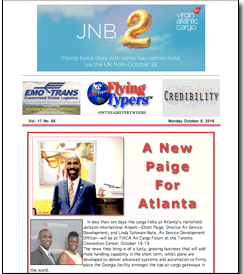
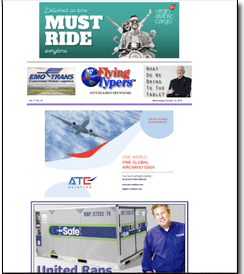 Vol.
17 No. 67
Vol.
17 No. 67